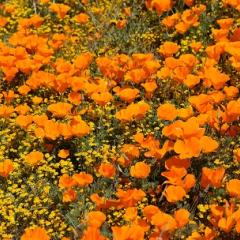Fraga quoted in Guardian on ramifications of superbloom recreation
Naomi Fraga was featured in the Guardian story: California town hopes to put tourists off the scent as another super bloom looms.
Lake Elsinore was inundated with superbloom visitors in 2019, which led to a variety of safety incidents and resident concerns. The rainy conditions this year have set the stage for a potential superbloom again, but it’s not certain it will materialize. The article states:
But if the variables do come together and California is treated to a colorful display, officials and scientists are pleading with the public to experience the phenomenon in less harmful ways. Selfie stick-wielding spectators not only caused calamity in Lake Elsinore – they also devastated the landscapes and the delicate flowers they came to enjoy.
Native wildflowers are already under siege, threatened by climactic changes, invasive species and human encroachment. Cautioning the need for a better understanding of what she called “the ramifications of recreation”, Dr Naomi Fraga, the director of conservation at the California Botanic Garden called for more awareness around how the public engages with the bloom.
“I don’t think it has to be this way, where we have to cordon off nature from humans. We can have a more positive relationship,” she said, noting that the issue largely stems from a lack of connection to the natural world that is missing in modern society.
She cautioned those who seek out wildflowers from inundating one area or straying from marked paths onto the sensitive soils. But even beyond the super bloom, there’s a need to shift perspective. In the age of social media, where landscapes have become backdrops for “likes”, a broader understanding of the ecology at work behind beautiful scenery is often neglected, which is why visitors overlook the damage they are doing.
“There is something missing there, in understanding that this is a natural ecosystem,” Fraga said. “It’s not just the poppies – it is the pollinators, and the soil microbes, and a network of biological life that requires an ethic of care for nature.
“It is not just for pulling likes and clicks and endorphins,” she added. “If an educational voice can be a louder voice than the influencers, that could do a lot of good.”



